People Make Roofing: Tracey Donels - PODCAST TRANSCRIPT
June 10, 2025 at 11:00 a.m.Editor's note: The following is the transcript of a live interview with Tracey Donels, founder of Service First Solutions. You can read the interview below, listen to the podcast or watch the recording.
Intro: Welcome to People Make Roofing, a call to action led by Roofing Talent America and RoofersCoffeeShop.com. We're tackling the industry's biggest challenges from outdated misconceptions to the widening skills gap. Our mission? To show the next generation the true potential of roofing, including the diverse opportunities, endless growth possibilities and a chance to make a lasting impact. Join us as we share unfiltered stories from the industry professionals across North America, inspiring and guiding the future of roofing.
Luke McCormack: Hello. This is People Make Roofing, I'm your co-host, Luke McCormack, CEO of Roofing Talent America.
Heidi J. Ellsworth: And I'm Heidi Ellsworth, president of the Coffee Shops, Roofers Coffee Shop and we are so excited to be here today for People Make Roofing with one of the leading, I'm going to say thought leaders and innovators in the industry. And that is Tracey Donel with Service First Solutions. Tracey, welcome to People Make Roofing.
Tracey Donel: Thank you very much for both having me. I'm very happy to be here. Excited to see you both again.
Heidi J. Ellsworth: You've got such a great story that we are so excited to highlight. Why don't we start out with some introductions, if you could introduce yourself and tell us about your company.
Tracey Donel: Excellent. Well, my name is Tracey Donel, like you said, I'm with Service First Solutions. We've been in business for about four and a half years and we are is a coaching, training and consulting company that helps commercial roofers grow their repair and maintenance business. I've found through my 20 years in the industry that when you focus on repair and maintenance, it can be the lifeblood and eventually the fuel for your roofing company. I think honestly, take the stress out of a business.
Luke McCormack: Well, Tracey, we are honored to have you as part of the show. I was initially introduced to you, Tracey through Steve Little and we met at the Roof Alliance meetings. And obviously I'd seen that you'd worked at KPost for almost 15 years before setting up yourself. I know a lot of people that know you. You're making waves in the market right now. I'm seeing all the people that you're bringing together and you're doing really great things. And I'm really keen to hear, how did it go? You're studying history in the University of Iowa and now you're running a national service company for training.
So really keen to hear how you got into the industry. And just before you do that, Tracey, People Make Roofing, why this exists is to shine a light on people like you. The industry has got some bad rep, which is way outdated now and we know how good the industry is, how good the people are in it. But the purpose of this entire episode is really to shine a light on you, Tracey, hear about what you're doing in the market, hear about your background, hear about your insights and how we can bring fresh blood in. So yeah, I just wanted to say that Tracey and if you want to take it away and tell us your story. Because I've never heard it and I'm very keen to. So fire away, my friend.
Tracey Donel: Excellent, thank you. Well, like a good man's story usually begins, it starts with a woman. So I was engaged to my fiance at the time and we were living in upstate New York and we were getting ready to move down to Dallas so she could get her PhD at UNT. And I was in the middle of not knowing what I wanted to do for a future. I had studied engineering, education, history. I had went to grad school for journalism. I was a really good student, but I didn't know what I wanted to do and I was too cheap to pay out-of-state tuition in New York. So when we moved to Texas, that was the same plan, was to find a job for a year and then eventually go back to school.
Because I still had no idea what to do. And like most people, I didn't find roofing, roofing found me. So we moved to Texas and my beautiful wife's stepmother said, "Hey, we have this roofing company. It's fairly new, we need some young blood. Would you like to try it out for a little bit? And if you don't like it, you can leave. And if you work here for a year and you go back to school, no problem." So I started at KPost April 1st, April Fool's Day, which my father-in-law always likes to joke about. Started at KPost April Fool's Day, just about now, 20, almost 19, 20 years ago.
And I was kind of like their quote-unquote "First intern." And that was exactly how I was explained to me when I started. They had about 50 or 60 employees, like I said, they'd only been in business for about a year. And they wanted me to work in a truck, learn the trade and then kind of bounce around from the department to department for a little bit and kind of figure out where I fit best. They didn't know how to do an internship. They had never done one before and I had never participated in one, so we were all kind of learning at the same time.
So I went in a truck, did three or four rear roofs, spent six months or so on a service crew. Got very dirty, got to do a pitch tear-off job, which I figure if that doesn't make me a roofer, I'm not sure what does. And then I started in the service department. That was my first, let's say, seat on my plan for my internship. And I never left. I sat down in that department as a kind of gopher, kind of scheduler and we had three trucks. And before I knew it, I had been there for years and we probably had six trucks. And before I knew it, I was running the department and we had 10 trucks.
And before I knew it, we had 22, 23, 24 trucks doing eight and a half, nine million dollars almost in repair and maintenance. And that's kind of how I got into it. I just kind of fell into it. But I really liked the job. I really liked the service aspect of the business, being both in the office and the outside of the office. And I'm an extreme busybody, so that just really works with the service aspect as well. And what I say is I'm the dummy who started in the service department and never got out. And 20 years later, I'm still in the service department, so.
Luke McCormack: Wow. And what I think is amazing about that, Tracey, is that just a bit longer than 10 years in the industry, starting from the bottom, you've never been able to set up your own company to service the industry nationally. Not everyone gets that, but you came working under the greats, Steve Little, Keith Post, Jayne, who you know very well. How important is it to have mentors to grow your career? And then once you get to that level, how important is it to give back? Because Steve, Keith, Jayne, they're all about giving back, helped me massively and keen to hear your insights on that, Tracey.
Tracey Donel: I learned, I mean, we all learned a ton from working there. Right? I mean, that shop was and still is a great place to come up in the industry because they do give back so much, because they do believe so much in education. I tell a story all the time when I was learning how to really grow my service department, Steve sent me on a trip to Florida to tour five roofing companies in five days. And they were all service departments that were bigger than mine at the time. And I just got to walk in and say, "I don't know nothing. Show me what works for you." Right?
And it's like I came back from that five-day trip with a PhD in roofing. And I'm happy now to count some of those customers that I visited or people that I visited as customers now. Right? So really believe in that education, believing in that mentoring and believing in letting your people get out of the office. This is something that we were just discussing at Western States board meetings this week. So because I did work for KPost and Steve was always pushing us to do more, he got me involved in the MRCA, Midwest Roofing Contractors Association, very early in my career.
And we started the YCC, the Young Contractors Council. Oh, man, it was about the same time National Women and Roofing started. When did the National Women and Roofing start, Heidi? 2016. So we started YCC in 2016 through MRCA and both of those were highly pushed by Mr. Little. And I remember being in that first meeting. And what I learned from getting out of my office and getting out from my leaders and my mentors was there's all kinds of ways to be successful. And that really helped grow myself.
And that's one of the reasons that I believe so much in young people's organizations and education just in general because I know what I benefited from the education that I've received in this industry, whether it be YCC or FEI through NRCA. I went through that program, [inaudible 00:09:33] was pushed through by Steve. But you need to have someone out there pushing you. Right? And I like to say that I'm hopefully now helping my companies do that and push them to grow their service and repair and maintenance departments.
Heidi J. Ellsworth: Tracey, I'm with you. I'm very similar. And one of the things I think you and I have very much and Luke, have in common is our entrepreneurship and really that drive. And I think there's a lot of people out there who don't realize the opportunities in roofing to own your own business, to be an entrepreneur, to really be able to do things that maybe are a little bit more difficult in other businesses. But I would love for you to share your story of how you decided to start Service First Solutions and really what drove you to do that and kind of where you're at now.
Luke McCormack: And just to add on to that, please, Tracey, I came from the UK roofing market and it was not the same as the US roofing market and the entrepreneurialism isn't rewarded as much. And just to add on to what Heidi said, how has it even been possible because like you say, Heidi, other industries, other countries, the opportunity isn't there. So yeah, I'd love to hear that.
Tracey Donel: Yeah. Well, when I left KPost, I knew I couldn't move because I had two young teenage daughters, one that was just starting high school and one that was just starting middle school and they wanted nothing to do with moving. And because of the agreement when I left, I also knew that I couldn't be a roofer within several counties in my area because the agreement I made when I left KPost. So I didn't really know what to do. And I knew I had a year to try to figure something out, but pretty quickly I knew that I wanted to try the coaching thing.
I wanted to try the consulting thing just to see what it was like because I knew pretty quickly I had been in this industry for long enough that it was going to be my shot to stay in service. And what I mean by that is if I wanted to open a shop or open a shop for someone else or move to become a general manager of a shop or something like that, I knew I would quickly be yanked out of service because service is not where the risk is in the company. And the owners and the CEOs and the journal managers, they have to follow the risk of a company and the risk lies in the projects department.
And I knew even if I started my own roofing company here in Dallas, let's say in a year, I would quickly be pulled out of that service bubble and pulled into the ownership and the risk bubble. So because I wanted to stick with service, I said, "Well, I got a year to figure it out, to see if it works, to see if I can do this and let's see what we can do. Let's see if it works out." And I'm happy to say four and a half years later, we are growing, we're adding to the team and it has worked out. But yeah, I didn't know what I didn't know. And I had saw you talk about mentorships, right?
Oh, another one mentor in my life has been Greg Hayne and we hired Greg Hayne to do a very similar thing that I do now. And me and Greg are great friends and he helped me start this business, but also he showed me that this business could exist. And this is something I brought up when we were both speaking at ServiceCon and I thank him for that. I think that's fantastic. And I think there's a couple other people in the industry that probably have Greg Hayne to thank for showing them that certain things can be accomplished if you follow your passion. And I can definitely say roofs, I don't know why, but roofing service is my passion.
Luke McCormack: Tracey, obviously, when I started this campaign six years ago, we found the name People Make Roofing and I was like, "Wow, that is it." And I was working with Greg and Greg has trained all my staff. He's gave me introductions. He's been really good to me. And when I met you, I was like, "Oh, are they competitors? Do they not speak to each other? If I have an opportunity, who do I give it to?" And then I seen a post on LinkedIn and it was you and Greg selfie, "This is my mentor."
And a lot of people would think that it's competitive, it's cutthroat, someone needs to lose for me to win. I really feel that's not the case in roofing. And the people in roofing are constantly putting their arms around each other, try to help each other up. And I was really surprised when I seen the relationship that you and Greg have. For someone who doesn't know the roofing industry, doesn't know the people within it, how would you describe that community, that camaraderie and that sort of mentorship, which is literally everywhere in this industry?
Tracey Donel: Yeah, it's very different. And I think that has a little bit to do with, like you said, specifically the industry we are in. This industry because we are in the industry of a need, not industry of a want, there's enough work out there. And for the people who do it right, the people who treat people, I always talked about the golden rule of service. Let's talk about the golden rule of entrepreneurship. Right? Or the golden rule of being a leader in the industry. Right? Treating people the way you want to be treated. If you're following that rule, there's more than enough work out there for all the right people and we can help each other.
Another story I tell, so I came up in roofing in the Dallas-Fort Worth area and one of our biggest competitors for as long as I worked at KPost was Empire Roofing. But a little-known story is, so some people know I am what I would say, conversational in Spanish. And a lot of people think I'm conversational in Spanish because we adopted a little girl from Columbia. But the real reason I'm conversational in Spanish is because I saw how Ronnie McGlothlin talked to every single one of his roofers when I was on a roof while employed at KPost with Ronnie walking an Empire Roof. And I was able to see that and say, "Well, look at this guy.
He can talk to every single person on the roof, ask him how their mother was, what they did this weekend." And that hit home to me. Right? And you wouldn't see that kind of camaraderie in a lot of industries. Right? And a lot with if we're selling widgets. Right? Or we're manufacturing stuff. And I think that really goes to show you not only the wonderful industry we're in and how people help each other, but also just how much work there is out there. I mean, look at your company, Roofing Talent America. We are not competing for jobs out there. We are competing for people. And if we have the right people, we'll go find all the work in the world if we want it.
Luke McCormack: A hundred percent, Tracey. One of my clients say that to me, say that it's no longer about winning projects, it's no longer about margin, it's about the people. He who has the people wins and he who solves that problem will get ahead. And you're right, it's all about the people. Obviously Heidi, I always say this, right? You're very humble. And Tracey, you'll probably back me up in this, that Heidi is probably the most connected person in the American roofing industry. Would we agree?
Tracey Donel: I'd say she's right up there. She's definitely on the Mount Rushmore of connectivity in the roofing industry for sure.
Heidi J. Ellsworth: Oh, you guys are making me blush. It's just because to your point, what you guys are both saying, is it's the people. It's the people. I mean, I think of Ronnie, he is just and Cheryl, his daughter and Sandra, they are great, great people. And we have so many people like that in this industry who we just, it's fun to know, it's fun to be connected with. And I think that makes it easy. It makes it easy to network and to get to know people and especially when we're all, like all of us, naturally curious. And I think that's one of the things. Thank you, Luke.
Because that's one of the things that gets me excited about this next generation. I'm seeing it right now with young people who are working in the coffee shops. Right? They are, in fact, Tracey and I were just talking. He's was recruiting to say, "Hey, Heidi, you need to have some of your folks on the YCC of MRCA." In fact, I think that was Megan you were talking about. And then the Western states was like, "We want Alex to be involved with us on the young." And so really bringing the young people in. Tracey, how can we do better? I mean, when you have folks like Luke and what he's doing, bringing so many people outside of roofing into roofing through they're finding the talent, but what's some of your advice for companies out there in attracting young people to this industry?
Tracey Donel: So I talk a lot about you have to set up a career path. Right? Nobody wants to be a roofer anymore. So not only do you have to sell them on the industry, just as hard as you're going to go out and find the next customer, you need to be spending just as much time, energy and commitment going out and finding your next employee. But when you find them, you really have to have a career path for them. And not everybody wants to be the CFO or the CEO or the owner or something like that. But this really gets down to knowing your people. Right?
And knowing what you need and finding the right people and saying, "Well, how do you see yourself growing with a company?" Right? And checking in with them often. And you have to spend just the time finding them. Like I said, I mean, I have nephews that I can't convince to come into the roofing industry that are trying to get jobs in the electrical union or waiting to hopefully not get laid off working for a agricultural company in the Midwest with green colors. I'm not going to say a name. But you have to sell them on the industry just like you would a customer.
Because nobody says, "Oh, I want to be a roofer when I grow up." Right? And even when we're responding to an ad in the LinkedIn or something like that, if you're not a roofer, you're never going to look at that job and say, "Ooh, I want to be a roofer." Right? I mean, this is why I see a lot of my customers taking the word roof out of the job posting. We're not looking for roof service technicians, we're looking for construction technicians. Once they come in, we'll tell them they're going to be working on a roof. People see roof and they think a residential roof. They don't even know flat roofs exists.
Luke McCormack: Yeah. So honestly, this is literally why People Make Roofing started because people look at the industry and they think it's unsafe, dirty, no career prospects, no money to get made and it's so not true. And then when you look at the younger generation. Right? You look at parents, teachers, career guidelines, counselors, they probably think the same. So there's no one saying you should join roofing. When I joined the industry, when I grew up, I didn't grow up in poverty, but a lot of the people that I was friends with, they did and I was sort of in those sort of circles.
And there was a lot of people that they didn't really know what to do with their lives and they didn't necessarily have the most commercial acumen. But after coming into the industry and seeing so many people that, okay, you're maybe not the best in the world at maths and history, but if you can graft for three, four years where you can go can blow your mind. It'll take your family out of poverty, it gets you off the tools. You can be a business owner, a project manager, you can be in marketing, sales, operations.
And I thought, "How do I do this? How do I actually show these people that the path exists?" Because there's career path maps on those tables and all that, but I thought, "I'm going to shine the light on the people that make roofing and ask them how did they get here." And so many people, they started as roofers and they became managers, executives and they really changed their family's life. So my way of trying to do it is this campaign and you are supporting it, Tracey. You're massively supporting it, Heidi. And I think that shine a light, show the success stories. And there is so many out there and I think as well, the industry's changing as well.
It's not all hot mop stuff anymore. There's lots of new application methods and with the competition, there's so much more money to get made as well. So the end goal for us with People Make Roofing is the Roofing Careers hub. And to your point about Ronnie, Tracey, I want it in English and in Spanish and I'm taking up a Spanish tutor soon. And we basically just want to give it to school teachers, parents, career guidelines, counselors, associations, a free asset that shows the career paths, the average salaries, the money that can get made, but most importantly, the interviews from the people that make roofing.
And hopefully a few people can watch that. Maybe a principal sees it and thinks, "Wow, this really can make a difference for my students. Let's start engaging with Clemson. Let's bring Tracey in to speak to the students about what a career could be." And I think globally, the industry has turned a corner a few years ago and I think we've got a lot of momentum with a lot of people getting their face out there, getting behind camera, going to careers and what the Alliance is doing. And you can speak on that, Heidi, is absolutely phenomenal. And I think that there's a lot to get done, but I think we're doing it, to be honest. I think a lot of people are doing it and I think America's leading the way. So full steam ahead.
Heidi J. Ellsworth: Well, yeah. No, I think so too. I really think we are seeing the shift. But one of the things, Tracey, I've heard you speak a couple times this year and I'm always inspired by what you're saying and what you're doing to help the companies. And one of the things that I see, if we're looking in the future, right? If we're kind of looking in our crystal ball, is that roofing is going to become more automated. We are definitely going to see robotics at some point and it really is going to come down to these service technicians who are maintaining the roofs, who are making sure things are right.
And that really opens up for everyone. Old days, well, if you couldn't lift this much or if you couldn't do that much, it might not be a fit. But we're going to be looking for people who are going to be able to maintain machinery, who are going to be able to be really detail-oriented on making sure things are going. What is some of your advice to young people coming out of school really to look at the industry different from when you started in it, from when I started in it and Luke started in it to where we're going? I mean, this is a different career path than it used to be.
Tracey Donel: Oh, yeah. I mean, there was nothing official, right? Back when we started. Right? It was just somebody saying, "Hey, do you need a job?" Or "I believe in you," or, "Hey, we need help," or whatever it happens to be. And now look at all the things you have available, just like Luke said, right? Working with high schools, shout out to SkillsUSA. That's actually coming up in Atlanta, right? I've been seeing all the state competitions all over LinkedIn. That's fantastic. I know ABC and a lot of markets is doing great stuff with subcontractor education and reaching out to trade schools and stuff like that. There's so much more out there.
But to Luke's point, everyone's getting smarter now, right? It's not like, "Oh, the roofers are only ones that figured out that we're going to need help in [inaudible 00:26:24]". It's the roofers, the electricians and everybody else like that. The framers, the plumbers. And the service is where the economy will go because products, products will get automized. Right? And driving will be automized, right? But there will still be a lot of services that will be still face-to-face and still need people for a while. I mean, all the drone technology is great, but they're not going to replace boots on a roof for quite some time, especially in the terms of a leak or something like that. So there's all kinds of industries you can get into.
There's all kinds of programs you can be... Hell, Clemson, right? They're doing roofing education. Right? There was never roofing education. I went to Iowa for engineering. Right? So there's just, there's way more, there's different ways to get involved and talk to people. Right? Go do an internship at a roofing company rather than just, "Oh, I'm an engineer, so I'm going to go do this or go do that or go do this," whatever happens to be. Pick the, I don't want to say the most competitive industries, but that's what they are. They're the most competitive industries. And unfortunately for us, but also fortunately for some of us right now, the roofing industry right now is not the most competitive. You can come out and you can shine.
Luke McCormack: I love that insight on it as well because when I speak to young people, I feel like grabbing them by ears and I'm like, "Do you not realize this industry is right for innovation? You can move up the ladder quickly. They're screaming out for young blood to come in." And when someone young comes into the industry, they're given so much exposure that they can very quickly move up. And to give us top five selling points of the industry. Number one is the people, number one is the progression, number three is the profit, number four is the life experience that you get.
And then number five is, I don't know, number five is the party. There's always events on, there's always people coming together. There's a camaraderie. Yeah. It's like no other. If it wasn't for roofing, I would still be back in Scotland. If it wasn't for roofing, my dad would maybe never have got out of his hometown back in the day. So you roofing's given me a lot and I'm trying to dedicate myself to give back like yous two guys are. And it's an amazing industry. I think that someone might watch this podcast and think, "They're just speaking that roofing's great," but honestly it's real. It's the truth. We've given our lives to it and we've come out better from it.
And someone's watching this and they're not sure about roofing, look at Clemson, look at SkillsUSA, look at all the jobs that are out there, the money that people are paying. Look at people's LinkedIn profiles and look at the progression that they've went through. And it's literally all there right now, ripe for innovation, not too competitive because of the skill shortage, the generation gap, the workers that are retiring, the owners that are retiring and the amount of new companies. We've got private equity money rolled into the industry. They know what they're doing. It's like best kept secret ever. But the more I talk about it, the more recruiters join. So I'm trying to stop that happening.
Heidi J. Ellsworth: I have to bring up one thing because I think it fits so much into this conversation. And last fall we had the Young Roofers competition that was international with the IFDS and you were there, Luke, I was there and Tracey, KPost had a team there, Durable had a team there and Global had a team there. And I have to tell you, I loved all of those guys. They were all great, but the KPost team was pretty amazing when they came in on the low slope and what they did.
And it really showed, I think a lot of people are, there's just so many different ways to be involved in the roofing industry, whether it's service, whether it's maintenance, whether it's publications, recruitment, manufacturing, distribution. But these young men came in, they worked the roof, they're foremen every day and they're doing amazing things. And they were just inspirational on how they performed in the competition, their manners, everything that came through to it. So I think, I don't know and I guess maybe we can bring this conversation to end, but I would love your thoughts too, on really kind of going back to your KPost days, how KPost brings all these young people in and brings them up to really shine in the industry.
Tracey Donel: Yeah. Well, it really goes back to that education. Right? And getting to know your people and setting up the vehicles for education. Right? I work with a lot of service departments, we talk about setting up a training program. And I said, "Well, yeah, I'm going to train my people." I said, "No, you need a plan and a schedule. Right? That's your vehicle for training. Now we have a path we're going to stay on." And they had a lot of that. Right? Whether it was when I first got started, who it was and it was kind of all thrown together. Right? But eventually it grew into KPost University where we would have 10 to 12 people take six months worth of classes that were put on by various executives. Right? Throughout the industry, throughout the year.
And we would teach the young people in the end of our company about the industry and get them to know more about what other people do and stuff like that. Roof tours, right? Not nearly enough people that work in roofing offices get out on roofs. Right? Education, right? Whether it's through education of NRCA, right? Whether it's Roofing 101 or the TRAC program, which is a fantastic value or all the other options they add. We've talked about FEI through NRCA. There's EMI through NRCA. But really setting up that program and giving that education, because if you don't get the education, people would never realize that the opportunities are out there. Right? And also be to try it out.
Right? I didn't know what I wanted to do coming out of college. I just know I wanted to enjoy what I did. So if I would've never said, "Oh yeah, I'll give this a shot," I never would've found roofing. Right? So just be willing to try something new, be willing to meet someone you've never met before and be willing to show up. Right? My mom's actually here today. She's going home. She had her here for Western, but my mom always said, half of life is showing up. Right? Show up, participate, give it a shot and see what happens. And but no, if you have those educational programs for your teams and even for the young guys in the field. Right? Field guys need to have a pay plan.
Right? The, "What's your future here?" can't be, "Well, just keep working and hopefully you'll get a raise every so years." Right? Every other year or whatever happens to be. All these project manager, sales people that we have growing through the industry, we're putting them on compensation plans and pay plans and bonus plans. And we need to do that same thing for the field guys. So we know, "Oh, if I do X, I get Y," or "If I get these three certifications and I perform admirably, I'm going to get whatever it happens to be." There has to be a plan for advancement, whether that is advancement monetarily or organizationally. And they had plans and that helped a lot.
Luke McCormack: And that's why they are one of the best out there and that's why you are in the position that you are now and why Steve and Keith and Jayne are legends of the industry. So I think that's so beneficial for any other roofers listening in. KPost have certainly set an example, but they're everywhere now. There's so many clients that I know that have got the universities, they've got their on board and they're training. And that's because the industry comes together. No one keeps it for themselves.
They share it with everyone else. And I know that you've got an event coming up as well, Tracey, where it's you're bringing all your customers together to share knowledge, best practice. And I'm sure we'll be hearing a lot more about that when you put that out. Very excited to be there. And long may you continue, Tracey. I'll be catching up with you over the next few days anyway. But honestly, Tracey, this conversation could go on forever hours, really enjoying the flow of everything you've got to say. You're successful, you're humble, you're a good person and we appreciate you. So thank you, Tracey.
Tracey Donel: Thank you very much. And I look forward to both, seeing you guys both at FRSA in a few weeks.
Heidi J. Ellsworth: We will see you at FRSA. And I have to tell you, I agree with Luke, this has been absolutely phenomenal. Tracey, you are an inspiration in this industry. Thank you so much for all you do.
Tracey Donel: Well, thank you both for the help you guys have provided. It is very important. And like Luke said, I was definitely a beneficiary of the program at KPost, for sure.
Luke McCormack: Well, thank you for listening, guys. Stay tuned for our next People Make Roofing episode coming up soon, available on my LinkedIn, Roofers Coffee Shops, YouTube, Facebook, all social media assets. If you have an amazing story or know someone who has an amazing story to share, please do let us know. But yeah, thank you for listening.
Heidi J. Ellsworth: Thank you so much. We'll see you next time on People Make Roofing.
Outro: Thanks for listening to People Make Roofing. Together with Roofing Talent America and RoofersCoffeeShop.com, we hope to shape the future of our industry. Share this episode and keep the conversation going because people truly make roofing.
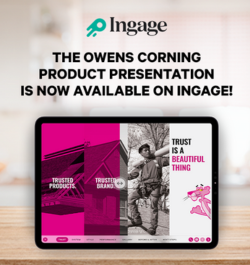












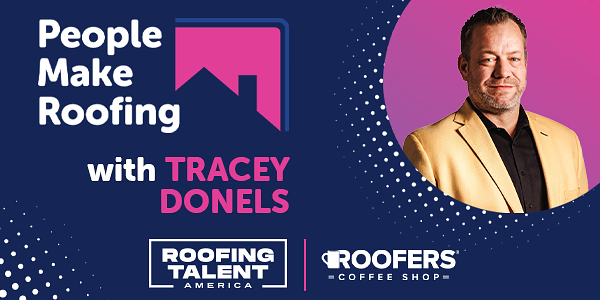
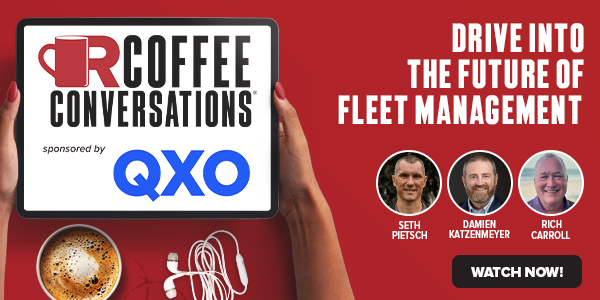
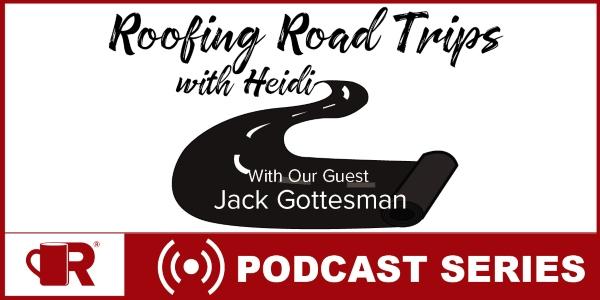
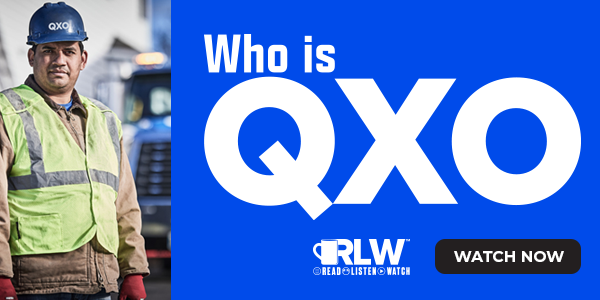




Comments
Leave a Reply
Have an account? Login to leave a comment!
Sign In